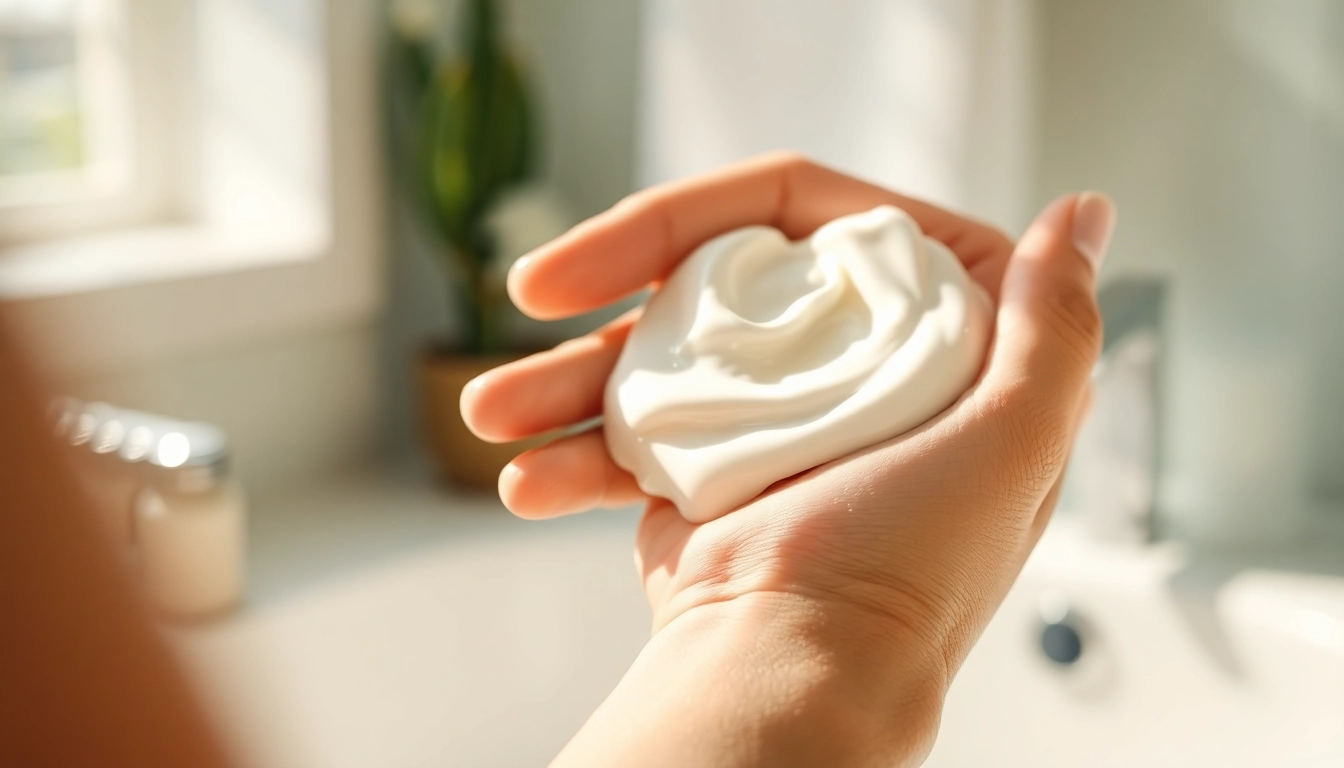Understanding Hand Moisturisers
What is a Hand Moisturiser?
Hand moisturisers are specialized skincare products designed to hydrate and protect the skin on your hands. These formulations aim to replenish moisture, especially in areas where the skin tends to be drier, allowing for smoother texture and improved elasticity. Using a hand moisturiser regularly can help maintain cutaneous health and prevent the discomfort associated with parched and cracked skin.
Key Ingredients to Look For
When selecting a hand moisturiser, it is essential to pay attention to the ingredients. Some of the key components that you may want to look for include:
- Humectants: Ingredients like glycerin and hyaluronic acid attract moisture to the skin.
- Emollients: Fatty acids and oils, such as shea butter and jojoba oil, help to soften and soothe the skin.
- Occlusives: These create a barrier to lock in moisture; common examples include petrolatum and lanolin.
- Vitamins: Vitamin E and Vitamin A offer protective benefits and contribute to skin repair.
- Botanical Extracts: Ingredients like aloe vera and chamomile can provide additional soothing and anti-inflammatory properties.
Benefits of Regular Use of Hand Moisturisers
Regular use of hand moisturisers can lead to several long-term benefits:
- Prevention of Dryness: Frequent application helps to combat the drying effects of environmental factors such as cold weather and indoor heating.
- Protection from Damage: A good moisturiser can create a barrier against irritants and help in healing minor cuts and abrasions.
- Improved Skin Appearance: Consistent hydration promotes a more youthful and healthy appearance of the hands.
- Enhanced Comfort: Moisturised hands are less likely to feel tight or uncomfortable, especially after washing.
Common Hand Care Issues
Identifying Dry and Cracked Skin
Recognizing the signs of dry or cracked skin on the hands is critical in selecting the right treatment. Common symptoms include:
- Rough texture and flakiness
- Redness or irritation
- Visible cracks or fissures
- A sensation of tightness or itchiness
Observing these symptoms can help you determine when to increase your moisturising routine or consult a professional for greater care.
Impact of Environmental Factors on Hand Health
Various environmental factors can influence hand health significantly:
- Weather Conditions: Cold temperatures and wind can strip moisture from the skin, while hot sun can cause sunburn or accelerated aging.
- Chlorinated Water: Frequent exposure to chlorinated water in swimming pools can lead to dryness and irritation.
- Detergents and Cleaning Products: Many household cleaners can be abrasive, leading to moisture loss through prolonged contact.
Being aware of these factors allows for better preventive measures, such as wearing gloves when doing chores or using hand creams with protective properties.
Myths Surrounding Hand Care Products
There are several misconceptions about hand care products that can lead to poor choices:
- Only Thick Creams Work: It’s a common belief that only heavier creams can deeply moisturise the skin. However, lightweight formulations can be just as effective if they contain quality ingredients.
- All Products Are the Same: Not all hand moisturisers are created equal; skin type and specific needs must be considered when selecting a product.
- Hand Moisturisers Are Only for Women: Hand care is essential for everyone, and men can benefit as much as women.
How to Apply Hand Moisturiser Effectively
Step-by-Step Application Process
Applying hand moisturiser correctly maximizes its effectiveness. Here’s a simple process to follow:
- Wash Your Hands: Begin with clean, slightly damp hands. This helps to trap moisture with the cream.
- Dispense the Right Amount: Use a coin-sized amount of moisturiser. Too much can leave a greasy residue, while too little may not provide adequate hydration.
- Rub It In: Warm the moisturiser in your hands before application. Apply it using gentle movements, covering all areas, including between the fingers and on the back of the hands.
- Pay Attention to Problem Areas: Focus more on dry spots or areas prone to cracking.
- Allow to Absorb: Give the product a moment to sink into your skin before engaging in activities that may wash it away.
Best Times to Moisturise Your Hands
Timing can influence the effectiveness of your hand moisturising routine. Here are some critical moments to apply your hand cream:
- After Washing: Moisturise your hands every time you wash them to restore lost moisture.
- Before Bed: A generous application at night allows the cream to work while you sleep, promoting repair and hydration.
- Post-Exposure to Harsh Conditions: Apply moisturiser after activities such as gardening or swimming, where your hands might be exposed to harsh elements.
Combining Moisturisers with Other Hand Care Products
Integrating various hand care products can enhance overall skin health. A routine might include:
- Exfoliating Scrubs: Using a gentle scrub once a week helps to remove dead skin cells, allowing the moisturiser to penetrate better.
- Nail and Cuticle Oils: Nourish nails and cuticles with dedicated oils post-moisturising to enhance the appearance and health of your hands.
- Sun Protection Creams: If your hands will be exposed to sunlight, consider a moisturiser that includes SPF for added protection.
Top Hand Moisturiser Recommendations
Best Drugstore Hand Moisturisers
For budget-conscious shoppers, several drugstore brands offer excellent hand moisturisers that provide hydration without breaking the bank:
- Neutrogena Norwegian Formula Hand Cream: Known for its concentrated formula that provides lasting moisture.
- O’Keeffe’s Working Hands: Ideal for those with severely dry hands, this ointment creates a protective barrier.
- CeraVe Therapeutic Hand Cream: Offers essential ceramides and hyaluronic acid for restoration and hydration.
Luxury Hand Care Brands Worth Trying
If you’re looking for pampering hand care, consider these luxury brands that specialize in high-quality formulations:
- Crabtree & Evelyn: Their hand creams feature rich botanical blends that hydrate and scent the skin beautifully.
- La Mer: Renowned for its luxurious textures, La Mer offers hand creams that are indulgent and effective.
- Jo Malone London: Offers a line of hand lotions that pair moisturizing benefits with captivating fragrances.
DIY Hand Moisturiser Recipes for Home Use
For those who prefer a DIY approach, crafting your hand moisturiser can ensure that you know exactly what goes into your skincare. Here are a couple of recipes to try:
- Basic Coconut Oil Moisturiser: Melt 1 cup of coconut oil and mix with a few drops of your favorite essential oil for a fragrant and hydrating concoction.
- Aloe Vera and Olive Oil Blend: Mix equal parts aloe vera gel and olive oil for a lightweight, soothing hand moisturiser that’s perfect for sensitive skin.
Maintaining Healthy Hands Year-Round
Seasonal Hand Care Tips
Hands require different care based on seasonal changes. Here’s how to adapt your routine:
- Winter Care: Use thicker creams and consider wearing gloves to protect hands from frigid air.
- Summer Care: Opt for lighter lotions and ensure to include sunscreen to protect against UV damage.
- Spring and Fall: Maintain regular hydration but pay attention to allergens and irritants that can exacerbate dryness.
Integrating Hand Care into Your Daily Routine
To maintain healthy hands, integrate simple habits into your daily life:
- Keep hand cream in reachable places, like your desk, car, or purse.
- Set reminders on your phone to moisturise throughout the day.
- Encourage family members to prioritize hand care, making it a shared routine.
Evaluating the Effectiveness of Your Hand Moisturiser
Tracking the performance of your chosen hand moisturiser is essential. Consider these evaluation tips:
- Observe Immediate Effects: After application, your hands should feel soft and smooth; if they still feel dry, it may be time to switch products.
- Monitor Long-Term Benefits: Over a few weeks, assess the reduction in dryness and improvement in skin texture.
- Check for Irritations: If you develop skin irritation or allergies, discontinue use and consult with a dermatologist.



